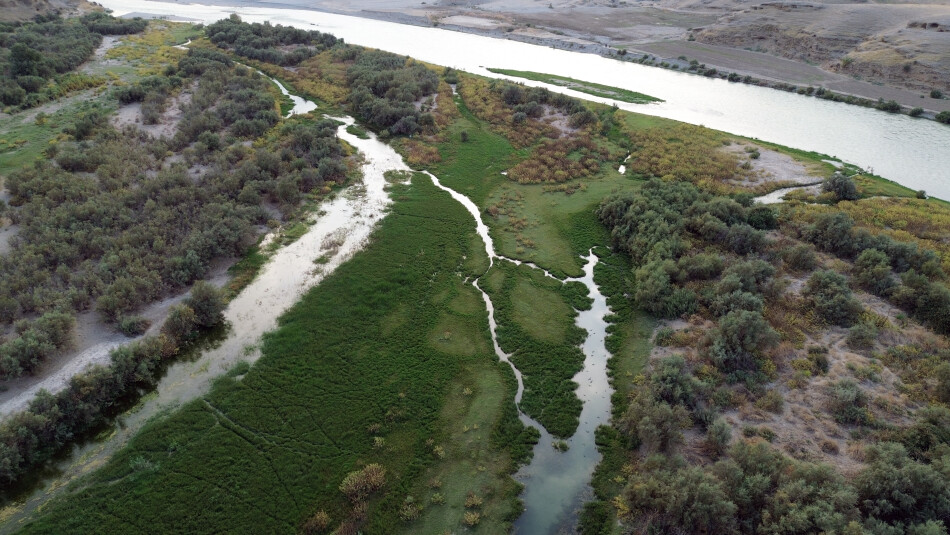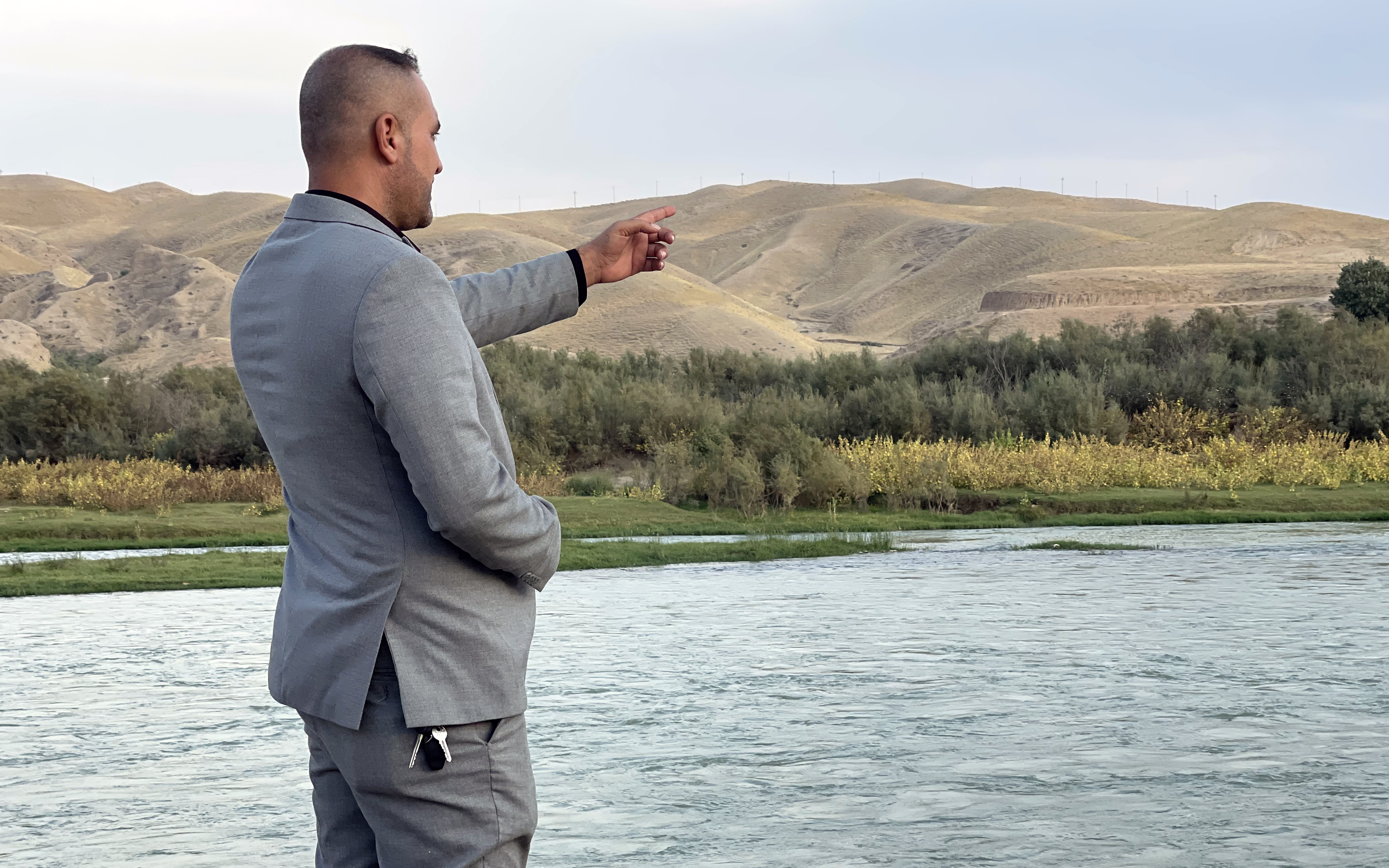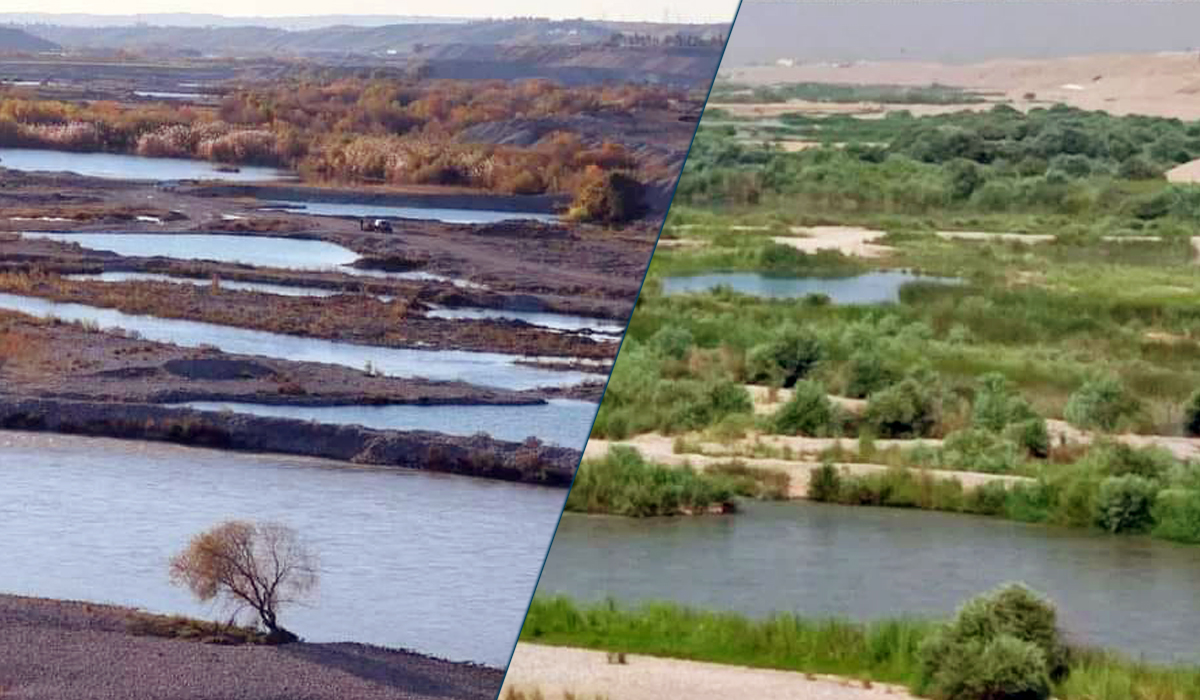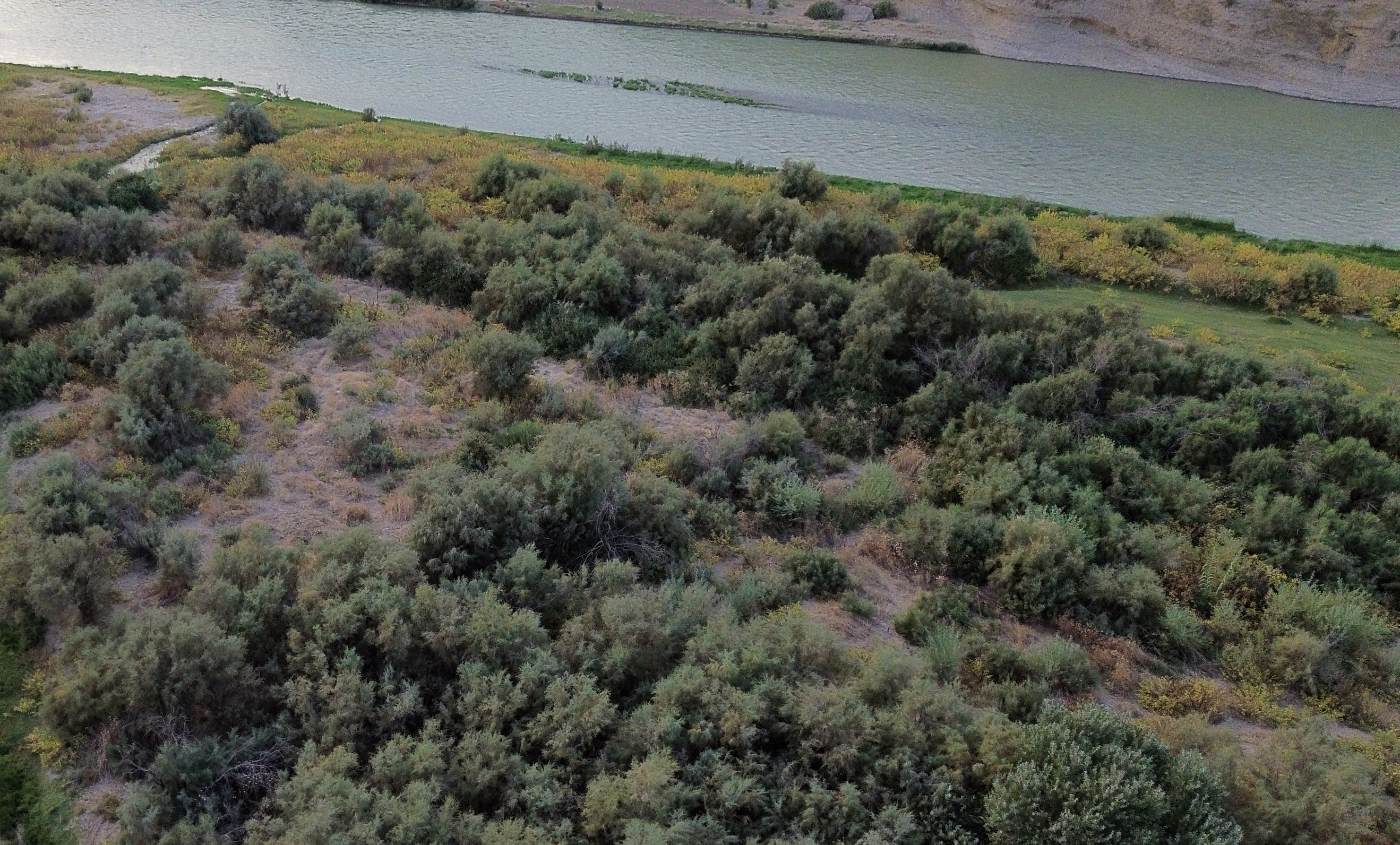
Sitting on the banks of the river, his eyes shine with happiness, when he sees a clear riverbed surrounded by greenery on all sides. The scene was different years ago, but his efforts and those of his colleagues have restored life to the river.
Ayad Mohammed frequently visits the Sirwan River, which he fought with his comrades without despair three years ago to save it from the harm of gravel factories until their efforts bore fruit.
The Sirwan River extends from Darbandikhan District towards the Garmian Administration, passing along Kalar District towards the central and southern regions of Iraq. The river suffered greatly due to the gravel and sand factories that caused large holes to form on the banks of the river, damaging its course, in addition to clouding the water and causing the surrounding trees to dry out.
"Stopping the gravel and sand factories on the Sirwan River had a major impact, as the river recovered and took steps towards improvement. There was a big difference compared to before," says Mohammed, an environmental activist who launched the "Yes to removing gravel and sand factories on the Sirwan River" campaign with a number of his colleagues.
The problem with the Sirwan River was cancer that affected the lungs of Garmian. The disease has now disappeared after the pressure we exerted.
The campaign was launched by three activists in 2019 and spread on social media and received support from all segments and groups of society in Kalar District (affiliated with the Garmian Administration within the Sulaymaniyah Northern Province). At the end of 2021, the campaign achieved its goal and forced the government to stop the work of all gravel and sand factories on the banks of the river.
No one denies the negative effects of gravel and sand factories on the river environment. The Environmental Protection and Conservation Authority under the Kurdistan Regional Government KRG has not granted work permits to such factories since 2014 because, according to the Authority’s Facebook page, they cause serious damage to the environment and distort the rivers. Therefore, it requested the Council of Ministers to stop their work.
Granting work permits to gravel and sand factories is based on the Mineral Investment Regulation Law No. 91 of 1988, and its authority is vested in the Ministry of Natural Resources. A portion of the procedures relate to the Environmental Protection Authority, which can grant work permits to administrative units according to a number of rules and regulations.
A campaign for the environment
There were only three of them when they announced the launch of the “Yes to the removal of gravel and sand factories on the Sirwan River” campaign. It was an unequal battle, but thousands of voices quickly joined the campaign.
The river was dying before the eyes of activists. The greenery began to disappear and the river’s water level was decreasing day after day. Environmental organizations, experts and citizens agreed on the necessity of closing these factories.
"The problem of the Sirwan River was like a cancer that affected the lungs of Garmian. The disease has now disappeared after the pressure we exerted," according to Soran Nariman, an environmental activist and campaign member.
The campaign has published and continues to publish information to the public about the damage caused by the factories to the Sirwan River through reports and press materials published in media outlets especially on social media platforms.

The Garmian administration initially decided to regulate the work of the gravel and sand factories, but the pressure continued until it was decided in a meeting in December 2021 attended by a number of activists, representatives of the relevant departments, environmental experts and organizations to remove the factories permanently.
"For the sake of the public interest and environmental protection, it was decided to remove the gravel and sand factories," according to a statement by the Garmian administration. It was also decided to provide facilities for factory owners to convert their projects into crushers and install them in other locations.
In 2021, a decision was also issued to regulate the work of gravel and sand factories on the Sirwan River, all of which were operating with a washing system, in coordination with the relevant authorities and environmental activists, according to Yadgar Fattah, Director of the Oil and Minerals Directorate in Garmian.
In 2024, another decision was issued stipulating that any factory that installs a gravel crusher is allowed to lift and use natural materials from the river by 50 percent according to the area allocated to it, which is three donums (0.3 hectares), and the decision stipulated the use of gravel crushers in order to obtain a work permit.
Remarkable changes have occurred, as life has returned to trees and green spaces
According to data from the Oil and Minerals Directorate, there were 40 gravel and sand factories on the Sirwan River, these factories extending from Darbandikhan to the Koks sub-district, 30 of which were operating continuously, but after the government decisions and the decision issued by the Garmian administration, their number has decreased to 10 factories, all of which are now operating with a crusher system.
According to a field follow-up of the Sirwan River, it was possible to clearly notice the changes that have occurred compared to several years ago, the river environment has become greener, water levels have risen, and even the sounds of birds can be heard now.
According to the Water Management and Protection Law No. 4 of 2022 of the Kurdistan Region of Iraq KRI, it is prohibited to change the course of water resources in a way that leads to a decrease in the amount of water, its pollution, or the occurrence of floods. It is also prohibited to establish any project or factory on the banks of the rivers, its branches, or lakes without obtaining a license from the Ministry.
These violations result in a prison sentence of not less than six months and a fine of up to 10 million dinars Iraqi Dinars IQD (USD6,700), and in the event of a repeat violation, the penalty is doubled.
The river water is flowing abundantly
A big difference has occurred in the waters of the Sirwan River compared to previous years.
"There have been noticeable changes, as life has returned to trees and green spaces," says Nariman, noting that their pressure has borne fruit, so that the course of the water has become stable and birds and animals have returned to the region.
The Sirwan River is one of the main sources of drinking water for the residents of Kalar district, as well as being a source of supply for fish farming ponds and agricultural fields.
According to the follow-ups of an expert in the environment and water resources in Garmian, the quality of the river water has changed for the better, after it was turbid and contained high levels of Total Dissolved Solids (TDS) and Total Suspended Solids (TSS), and the degree of water hardness has decreased in general, as it was high due to the factories.
"Removing the gravel and sand factories had a positive impact on the river. We conducted scientific research at Garmian University to determine the effects of closing the factories and it was found after comparing the percentage of greenery and water quality and the results are encouraging," according to Dr. Abdul Mutalib Rifaat, an
environmental management expert and professor at Garmian University.
He praised the step that led to an increase in green spaces and an improvement in water quality, especially in the areas from which the plants were removed.
The campaign did not stop there, as it also affected the activation of laws related to holding violators accountable, especially the Mineral Investment Regulation Law No. 91 of 1988.

The Director of Oil and Minerals, Garmian, says that the directorate has tightened its procedures, and decided not to renew the work permit and close the gravel crusher factories in the event that their owners commit any violation.
"Since the plants were converted into crushers, no environmental violations have been recorded, except for violations related to extracting more materials than the amount specified for them, the view of the river proves this fact," Fatah stressed.
Before the results of the campaign to remove gravel and sand factories appeared, the number of violations in 2021 reached 32 violations and violators were fined more than 77 million IQD, but in 2022, after removing the factories, only four violations were recorded and their perpetrators were fined about six million IQD and during the past ten months, only one violation was recorded, according to statistics from the Oil and Minerals Directorate in Garmian.
Factory owners do not deny that removing their factories and converting them into crushers has revived the river environment.
Arkan Muhyiddin (42 years old), owner of the Qoratu factory and crusher in Kalar, says that the procedures only allow crushers to operate and not gravel and sand factories. "We must adhere to the conditions that include allocating an area of 3 donums for work and we must not pollute the river environment, otherwise we will be subject to penalties."
He pointed out that his work is a source of livelihood for 20 families and he had over 50 daily workers.
The government is closely monitoring them and has set tough conditions for them and is forcing them to sign contracts and pledges.
Some of the penalties related to the defacement and removal of trees are based on the KRI Forest Protection Law No. 10 of 2012, which includes imprisonment for up to one year and a fine of up to five million IQD.
"Since the closure of the factories and the installation of the crushers, we have not received any violations for us to take action against the perpetrators," according to Rashid Bakir, Director of the Garmian Forests.
According to the Environmental Protection and Improvement Law, the violator is punished with imprisonment for up to one month and a fine of up to 200 million IQD.
Dureid Salim, Director of the Garmian Environment Department, says that his department monitors the work of the crushers and in the event of their violation of the instructions, they are referred by a special committee to the relevant authorities and the public prosecutor.
The campaign faces challenges
“One of the obstacles we faced as members of the campaign was that there was pressure to restart these factories,” said Nariman, one of the campaigners.
He assured the government is closely monitoring the plants, heavy conditions have been set for them per contracts and written warranties, one of the conditions is to first install the crusher, then the factory, so that its works half by half.
He is optimist because the procedures have been tightened and violations will end with the cancellation of the plants’ contracts.
The campaign continues through monitoring and follow-up so that they do not remain silent about any violations they see.
Last February, the Garmian administration issued some other instructions, not only did not allow the resumption of factories, but demanded that each factory restart on condition that the installation so that onvce installed, it uses 50 percent natural materials and 50 percent stone.
"It is not allowed to carry materials in the Sirwan River, destroy natural forests and cut down trees."
Now the situation is much different and better, both in terms of the increased amount of water and the amount of greenery and trees.
“If they commit violations, their contracts will be cancelled. The relevant authorities will document the nature of the Sirwan River and forests, and then compare the documents with the current conditions and present it to the public."
Choman Ahmad, head of media and communications of Garmian administration, refused to resume operations in the same way as before they have agreed on it.
“We do not know where did they get this information but have nothing else except the memo the factories signed in the presence of all parties.”
He confirmed they will not allow factories to operate as before.
However, not all the dangers are gone, as an environmental expert points out, the crushers have its downsides and deteriorate air quality due to the dust it emits.
"Like the factories, they have a bad impact on the environment because they produce dust, which causes air quality to deteriorate," he said. “Part of the dust rests on the leaves of the trees and weaken them.”
The owners of the current factories and the previous factories are still not satisfied. According to Haval, his business was the only sources of income for 20 people and earned job opportunity for 50 workers.
The campaign “Yes to remove the mud factories on the Sirwan River” has reduced the threat to the environment in three years and they do not intend to give up so easily.
A walk on the river
In previous years, Bana Soran, (25), a resident of Kalar, rarely went to the Sirwan River because she could not find a quiet and suitable place, unlike now.
“Now the situation is much different and better, both in terms of the amount of water, greenery and trees, so we visit the river several times a month,” Soran said. She sometimes accompanies their guests to the area.

A green spot on the Sirwan River, Garmian, October 2024. Ziryan Mohammed
Not only environmental activists, but people in general are happy with the river's revival after the factories have been reorganized, alike Karwan Ahmed, 40.
“The river is now so attractive that every weekend a take my family there for picnic.”
The Sirwan River is a place of recreation for people in all seasons, especially for picnics and short trips.
Nariman explained that unlike in the past, when there was no monitoring and follow-up for violations, "now the government has an active role in protecting the river."
Nothing has changed in the market situation and people's needs since the factories were established, because according to official statistics, 10 crushers operate and meet 90% of the market demand.
“People's response to our products is very good, which we produce through the factory, since is from the rocks that have accumulated in the river,” said Arkan Muheddin, owner of a factory.
The crushers collect rocks from the river and grinds them to produce sand, rather than digging holes like a factory and pouring water into the river to produce natural sand for construction.
Hamid (38 years old) who runs a crusher in Kalar said that "people are now buying the sand produced by the crushers, as it is of good quality because it is produced from large gravel that we have turned into sand."